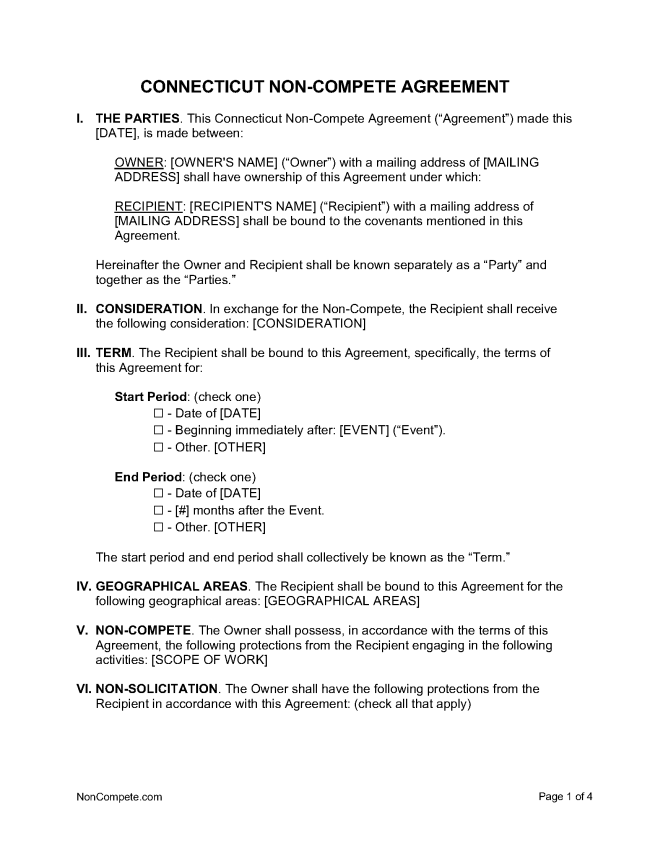A Connecticut non-compete agreement is a legal document or a portion of a legal document that limits the ability of someone or a group of people to conduct business. The agreements may appear in the context of the sale of a business or in connection with an employment agreement.
In Connecticut, non-compete agreements are only permitted if they are reasonable; whether a non-compete agreement is reasonable is determined by weighing several factors; if the agreement is unreasonable with regards to any of the five, the agreement is unenforceable.
Table of Contents |
Are Non-Competes Enforceable in Connecticut?
Yes, provided certain conditions are met. Non-compete agreements are enforceable only if the restraint they impose on trade is reasonable. (Scott v. Gen. Iron & Welding Co. (1976))
There are five criteria for determining the reasonability of a covenant not to compete:
- The length of time the restraint is in effect
- The geographic area covered by the restriction;
- The degree of protection given to the party benefiting from the promise not to compete
- The restriction of the employee unable to pursue their trade, and
- The extent of the interference with the public’s interest.
If any of these five criteria are deemed unreasonable, the non-compete agreement is not enforceable. (New Haven Tobacco Co. v. Perrelli (1989)).
Time and Geographic Area
Time and geographical considerations are intertwined when determining whether a non-compete agreement is reasonable. A restriction covering a large area might be reasonable if it’s in effect for a brief time. A restriction covering a small area may be reasonable for longer. (Van Dyck Printing Co. v. DiNicola (1993))
Valid Protectable Interest
Non-compete agreements that seek to protect new and current customers when the agreement is triggered are not automatically unreasonable. (Robert S. Weiss and Associates Inc. v. Wiederlight (1988)).
In non-compete agreements made in connection with the sale of a business, the agreement must be reasonably necessary for the fair and just protection of the business’s goodwill. (Domurat v. Mazzaccoli (1951))
An employer’s need to protect trade secrets is a legitimate protectable interest. (DeLeo v. Equale & Cirone, LLP (2021))
A customer list may be a trade secret, and an employee may be restrained from using the list if the employee acquired it in confidence from the employer. However, there is no trade secret if the customers’ names can readily be ascertained through ordinary business channels or reference resources. (Robert S. Weiss and Associates Inc. v. Wiederlight (1988))
Restriction on Employee
Although antisales agreements, which prohibit the former employee from transacting any business with the former employer’s clients, are broader than nonsolicitation agreements, which prohibit only the employee from actively trying to obtain the business of the former clients, they may still be upheld if reasonable. New Haven Tobacco Co. v. Perrelli (1989)
Interference with the Public Interest
In determining whether a non-compete agreement unreasonably deprives the public of essential goods and services, courts consider the scope and severity of the agreement’s effect on the public and the likelihood that a restriction will create a monopoly. (DeLeo v. Equale & Cirone, LLP (2021))
Prohibited Professions
Attorneys may not enter agreements — including employment contracts and partnership agreements — that limit their right to practice after the agreement ends, except for agreements concerning retirement benefits. Attorneys cannot settle cases in a way that limits their ability to represent a client. Connecticut Rules of Professional Conduct, Rule 5.6.
However, agreements made in connection with the sale of a law practice may restrict the activities of a lawyer who moves to another state or a different market region within the state or agrees to cease practicing a particular area of the law that was the subject of the sale. Connecticut Rules of Professional Conduct, Rule 1.17.
Non-compete agreements involving licensed physicians may not contain limitations on the physician’s practice lasting longer than one year or covering an area of more than 15 miles where the physician practices. The non-competition agreement must come about as the result of a partnership or other ownership agreement, and the agreement cannot be automatically renewed. Conn. Gen. Stat. Ann. § 20-14p(2)(A).
Non-compete agreements are not enforceable against physicians who’ve been terminated by the person trying to uphold the covenant unless the physician was fired for cause. Conn. Gen. Stat. Ann. § 20-14p(2)(B).
Terminating an Employee
Non-compete agreements are enforceable even if the employer terminates the employee. (Robert S. Weiss and Associates Inc. v. Wiederlight (1988)).
Burden of Proof
There is no general rule about which party has the burden of proof in non-compete agreements. However, a party claiming that a geographic restriction was unreasonable in an otherwise valid non-compete agreement has the burden of proof. (Scott v. Gen. Iron & Welding Co. (1976))
Continued Employment (Consideration)
Continued employment alone is not sufficient consideration to make a non-compete agreement enforceable. (Timenterial Inc. v. Dagata (1971))
However, if an employee has already begun working, but some of the terms of employment are still to be decided, there may be sufficient consideration for the agreement to be enforceable. (Van Dyck Printing Co. v. DiNicola (1993))
Maximum Term
There is no maximum term for non-compete agreements in Connecticut because the length of time a non-compete agreement is allowed to endure depends on the geographic reach of the agreement. (Van Dyck Printing Co. v. DiNicola (1993))
However, courts have upheld restrictions lasting as long as five years. (Scott v. Gen. Iron & Welding Co. (1976))
Blue Penciling (allowed)
A court can reform or modify a covenant not to compete only if the text of the agreement contains distinct parts, one or more of which can be eliminated without affecting the rest, such as in the case of an agreement that lists specific areas where a former employee would no longer be allowed to conduct business. (Beit v. Beit (1948))
